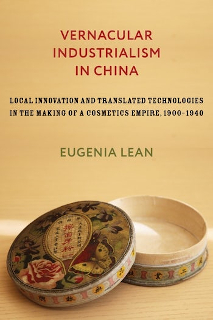 In this episode of Perspectives, we speak with Eugenia Lean, author of Vernacular Industrialism in China: Local Innovation and Translated Technologies in the Making of a Cosmetics Empire, 1900-1940.
In this episode of Perspectives, we speak with Eugenia Lean, author of Vernacular Industrialism in China: Local Innovation and Translated Technologies in the Making of a Cosmetics Empire, 1900-1940.
Did the process of industrialization occur in the same manner around the world? How did a Chinese romance novelist create a cosmetics empire that outperformed Japanese and European brands?
Listen in as professor of Chinese History Eugenia Lean tells us how Chen Diexian (1879–1940), a man of letters, transformed Chinese industry in the early 20th century. Funding his business ventures with the profits from his romance novels, Chen tinkered, experimented, translated, copied and marketed his cosmetic and home pharmaceutical products to become a titan of industry. By analyzing how Chen created his Butterfly Toothpowder, patented fire extinguisher foam, and built local supply chains for his powder-based cosmetics, Lean shares a history of modern industry that tells a different story from the factory-based production in the US and Europe. Moreover, Lean explains how knowledge production and technological innovation can work together with poetry, “how-to column” journalism, and cultural translation and how innovation is not necessarily mutually exclusive from imitation.
Closed-captioning available on YouTube.
To cite this podcast, please use footnote:
Eugenia Lean, interview, Perspectives, Consortium for History of Science, Technology and Medicine, June 15, 2022, /video/137.
 Eugenia Lean received her Ph.D. from UCLA in 2001. She is Professor of History and East Asian Languages and Cultures and current Director of the Weatherhead East Asian Institute at Columbia University.
Eugenia Lean received her Ph.D. from UCLA in 2001. She is Professor of History and East Asian Languages and Cultures and current Director of the Weatherhead East Asian Institute at Columbia University.